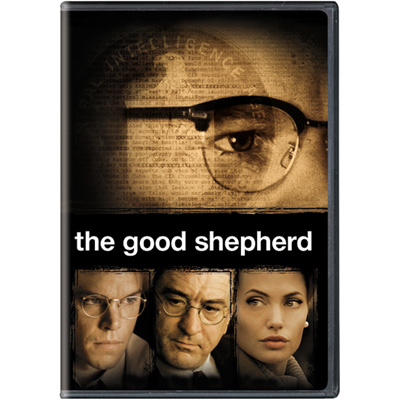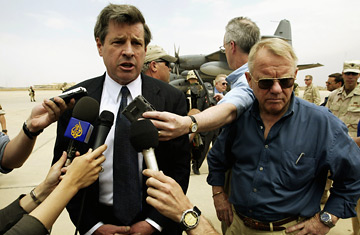The Good Sheherd - Sicko - No End In Sight
Thursday evening we went to see "The Good Shepherd".
The title itself suggests the resistance to the usual commercial norms of the film (the French title is "Raisons d'Etat"), it is also nearly three hours long, has a complex time structure - jumping backwards and forwards), an intelligent script - so even I, who already knows quite a bit about the CIA, Cold War, etc., was grateful to Wikipedia afterwards for clearing up some points in its plot summary.
A woman and her fidgety son left the cinema halfway through (to my relief) - it's not your usual Hollywood, action-and special effects packed product. So it is very welcome; as a number of actors and film critics have noted, there aren't very many intelligent films being made these days and it's significant that it was directed by an actor, Robert De Niro.
The reaction to it amongst critics was very mixed, about 56% being negative (www.rottentomatoes.com); but significantly the audience reaction (admittedly a self-selected group, but over 15,000 of them), was 70% positive. As Chomsky would point out, this tends to reflect the fact that the general US population, despite the usual propaganda, tend to be to the Left of the supposedly "liberal media".
Public reaction was more positive, with members of the Internet Movie Database (www.imdb.com), giving the movie an average score of 7.0 out of 10 from 15,318 ratings.
By contrast one gets this kind of patronising put-down from the Salon:
You can hear the movie's impending themes thundering through the forest before their massive heads even start poking through the trees, chief among them the idea that duplicitousness in the name of duty - particularly when you're working for the U.S. government - can poison not just your heart but your whole family. This is a somber, weighty, gray picture, one that pays clear tribute to the "Godfather" movies as it tries to scale some very rocky moral territory. But it's so unsatisfying to watch that even its biggest, most meditative right-and-wrong quandaries come to seem puny.
A Salon reader helps put this in context and reveals her anti-liberal bias:
Do what I've done, and look back over the long list of highly accclaimed movies with a strong social or political message component and try to find one strong positive review from Ms. Zacharek. Particularly when the movie has a liberal bent to it. Most particularly there.
She near uniformly takes the same track in all of them; angles like-- nice try, or cute message, or boring, or badly constructed-- jeese, she hated American Beauty AND Jarhead, LOVED "Charlies Angels", loved Anapolis, hated Syrinia (too complicated)-- and so on. Get the picture? She usually doesn't.
But, to avoid generalizing about the mainstream media, there were also very positive reviews, e.g. from the Los Angeles Times:
It's taken a dozen years for Eric Roth's smart, thoughtful, psychologically complicated script to reach the screen under Robert De Niro's careful and methodical direction, and it is easy to see why.
When Hollywood thinks spies, it thinks "Mr. & Mrs. Smith," it doesn't want to deal with an intricate, deliberately paced 2-hour and 37-minute work that not only quietly presents this quicksand world but also makes us feel what it would be like to live in it.
At the heart of this drama is Edward Wilson (Matt Damon), whose life in and out of the agency we follow for more than 35 years. He is the spymaster's spymaster, in the espionage business from the earliest World War II days of the Office of Strategic Services, the organization that gave birth to the CIA.
... Damon, in his second major role of the year (after "The Departed") once again demonstrates his ability to convey emotional reserves, to animate a character from the inside out and create a man we can sense has more of an interior life than he is willing to let on.
An argument could be made, in fact, that De Niro himself, famously undemonstrative in interview situations, was in part able to direct this role and this picture so well because he perhaps saw something of himself in its protagonist.
Because of the great regard his fellow performers have for him, De Niro was able to attract an impressive cast of costars.
By Kenneth Turan, LA Times Staff Writer
I think they also wanted to be involved because it was an intelligent script and involved some serious acting rather than a set of stunts (significantly a number of stars have taken time out from films to play stage roles for a tiny fraction of their usual fees).
I found the scene with the Soviet defector (who claims to be the real thing and the one the Americans have been using is a double-agent masquerading as him) to be very powerful. It reminded one of the revelations about Abu Ghraib and the hair-splitting of US gov legal apologists about the distinction between torture and inhumane treatment of captives. They beat him up in an attempt to get him to retract his claim about his identity, and when that doesn't work, wrap a cloth round his head and pour water on it till he is choking. They then try using LSD on him as a "truth drug".
But during his "trip" he does come out with the truth but not the one they wanted; he says that the USSR is not a great power, that it has major systemic weaknesses and that the US only pretends it is a real threat in order to justify its military-industrial complex and imperial ambitions.
Coppola is an executive director on the film, and that the frequent return in The Good Shepherd to the taped conversation, and attempts by the CIA technicians to clarify, it is very reminiscent of Coppola's own great but often neglected film, "The Conversation". He directed The Godfather in order to be able to make it ! The Conversation is also not a very commercial film and Gene Hackman plays a very introverted, paranoid character rather like Wilson (Matt Damon) in The Good Shepherd (and so different from the the extrovert cop role Hackman played in The French Connection 1 & 2):
- The Conversation By Roger Ebert January 1, 1974
... It's a movie not so much about bugging as about the man who does it, and Gene Hackman's performance is a great one. He does not want to get involved (whenever he says anything like that, it sounds in italics) -- but he does. After he has recorded the conversation, he plays it again and again [and filters out background sound to clarify the conversation] and becomes convinced that a death may result from it, if he turns the tape in. The ways in which he interprets the tape, and the different nuances of meaning it seems to contain at different moments, remind us of Antonioni's "Blow Up." Both movies are about the unreality of what seems real: We have here in our hands a document that is maddeningly concrete and yet refuses to reveal its meaning. And the meaning seems to be a matter of life and death.
The movie is a thriller with a shocking twist at the end, but it is also a character study. Hackman plays a craftsman who has perfected his skill at the expense of all other human qualities ...
Ebert review
While I found the film interesting and only occasionally "ponderous" (cf the otherwise positive review by Philip French in the Observer) and I welcome such thoughtful films about major political issues, it was a pity that, as usual with a Hollywood drama, the focus was so much on the individual. Thus it concludes with a shot of the protagonist (Matt Damon, in another almost non-speaking part) entering the new CIA, having lost his wife and (it's implied) having killed his son's fiance and his own grandson.
But what is obviously more important is what the creation of organisations like the CIA, did, not only to those who worked in them, but to others around the globe and thus to Americans through "blowback". Though, to be fair to the CIA (OK, maybe this is taking fairness too far :-) ), they have given accurate, pessimistic assessments (apparently this was the case with Iraq as well as Vietnam) only to have these ignored by crazies like Bush, Cheney, et al.
While I haven't yet seen Michael Moore's "Sicko" I'm very pleased to read about its success, even though being so overtly political. But then it's easier to do that in a documentary, and Moore's big achievement is to make popular documentaries, which also get people talking and stir things up. The Democrats are currently pushing for a better medical system; I think the timing is no coincidence, cf:
Michael Moore's new film, "Sicko," is a communal experience that begins the moment you stand in line to get tickets and continues through the laughter and moans you hear during the film to the tears and outrage you see expressed as you exit the theater. This is more than a movie, it's an experience to share with others.
Michael Moore has done it again. He has sparked a hot conversation that has the potential to start a raging fire under our national politicians to actually do something about something that everyone admits is a problem.
http://www.michaelmoore.com/sicko/news/article.php?id=10073
Moore is a politico-comic genius, here's his latest idea, which is bound to get yet more TV coverage;
You now have the opportunity to print and carry your very own "'SiCKO' Health Care Card." Playing the 'SiCKO' card has worked for a family in DeBary, Florida, whose daughter suffered profound hearing loss and was denied a cochlear implant. Her father sent a letter to Cigna asking, "has your CEO ever been in a film before?" Before he knew it, his daughter's denial was overturned. It also worked for a family in Flint, Michigan who was stuck with a $66,000 medical bill until they posted their healthcare horror story on YouTube ...
http://www.michaelmoore.com/sicko/what-can-i-do/health-card/
Arguably Moore's success has helped the cause of other documentary makers; docs aren't now seen as inherently rather boring.
Richard Schickel thinks "No End In Sight" is likely to be the most important film you'll see this year, and, despite the largely "talking heads" material, it is by no means boring:
No End in Sight: Iraq in Harsh Light
TIME magazine Friday, Jul. 27, 2007 By RICHARD SCHICKEL
Ambassador Paul Bremer and General Jay Garner from No End in Sight, directed by Charles Ferguson.
Basically, it is just a talking-heads documentary, interleaved with some routinely dismaying shots of deadly carnage in a far-away place. Moreover, what those heads are talking about is a failed political policy -- not, on the face of it, the most riveting of cinematic subjects.
That said, prepare to be riveted: No End in Sight, Charles Ferguson's first film, is without question the most important movie you are likely to see this year. It is not a film that simply massages your pre-existing attitudes about the war in Iraq. Rather it is a work that tells you things you almost certainly did not know about that disaster or things that have been lost to sight as chaos, anarchy and our feelings of helplessness have grown over the years since the invasion of 2003.
...
It can be argued that this film is largely addressing mistakes and grievances that are now beyond redress. But that's not strictly true. The kinds of errors it examines are entirely duplicable. And it is important to have this grand compilation of serious, sometimes anguished, testimony to remind us that big talk is always cheap and essentially dreamy. Who knew that a bunch of medium shots of well-spoken, nicely dressed men and women could transcend mere journalism and bring us very close to the authentic tragedy lurking behind the Green Zone's concrete walls.
http://www.time.com/time/arts/article/0,8599,1647716,00.html



No comments:
Post a Comment